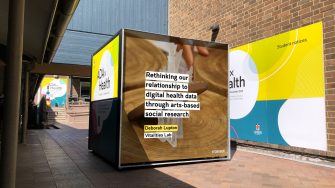ADA x Health
The Faculty of Arts, Design & Architecture (ADA) presents ADA x Health, a month-long program of research collaboration and knowledge sharing that emphasises our imaginative and community-focused ways of improving health.
The Faculty of Arts, Design & Architecture (ADA) presents ADA x Health, a month-long program of research collaboration and knowledge sharing that emphasises our imaginative and community-focused ways of improving health.

Join ADA x Health as we take residency at The Bank (Kensington Campus) until November 17. You can check out the bespoke STORYBOX installation outside The Bank or join us for a program of workshops, meetups and talks that showcase ADA's health strengths in the areas of communities, creativity, policy, spaces and care.
“When we look at the incredible significance of health in every community – in every part of the world – to people's wellbeing, satisfaction, capacity to care for each other, and capacity for societies to do well,” says Professor Christy Newman, Associate Dean for Engagement and Impact. “You can recognise that every discipline, every field of research, needs to be contributing to improving health and wellbeing. It's a fundamental dimension of life.
“The thing that really strikes me when I look at the research that happens in ADA is that we think about health problems differently – and we think about how to respond to them differently. The ways that we work with health issues really reveals why we need different kinds of thinkers, different kinds of practitioners contributing to solving problems in relation to health. ADA x Health demonstrates how creativity helps us understand health issues, understand other people's experiences, and why they matter and come up with creative solutions beyond the existing approaches.”
ADA x Health is a flagship public program celebrating the strengths of ADA in creating projects that are helping to make a difference in health across a diverse range of populations in Australia and around the world.
The faculty has a strong history in promoting collaborative approaches to health research, with research centres that have been around for 30-40 years that are considered globally pioneering in relation to responding to health crises by working in partnership between universities, community and advocacy organisations, clinicians, policymakers and others. The Centre for Social Research in Health, for example, was funded from the original government investments in response to HIV and in that context, working in collaboration across those sectors, was essential in being able to ultimately overcome the HIV crisis.
UNSW also has a history of social researchers, social scientists and others working in an interdisciplinary sense, collaborating with researchers from Arts & Media, Education, Built Environment, and other specialities.
ADA x Health has been led by Dr Scott Brown, an inclusive design researcher from the School of Art & Design with a passion for health, wellbeing and inclusion, who has brought together the researchers in ADA with a similar focus and put together stories describing their research and impact.
As part of the project, during ADA x Health a 2m x 2m STORYBOX outside The Bank, on our Kensington Campus, will display a curated program of content featuring several of these projects.
There is also a full program of events over the course of the month, covering a diverse range of research areas. There are workshops looking at inclusive research design and collaborations relating to LGBTQI+ health, neurodiverse communities, people with neurocognitive disabilities, as well as physical disabilities, including inclusive approaches to code designing. There are also activities focused on the built environment and architecture, with a focus on helping humans stay healthy in the face of increasing heat. From workshops on health information ecologies, inventing future pets (looking at automated care), and broadening out understandings of menopause to include queer and trans experiences, there is a tremendous diversity of research, modalities and communities to engage with.
On the very last day there will be a session which is focused on ADA’s short courses, which will be a great opportunity to learn more about some of the particular methodologies that ADA excels in: Inclusive Design, Poverty and Inequality, Urban Heat, Students on the Autism Spectrum, Creative Approaches to Working with Trauma and Reducing Stigma in Health Care.
Make a trip to The Bank this month and partner with the Faculty of Arts, Design & Architecture in thinking differently about health.